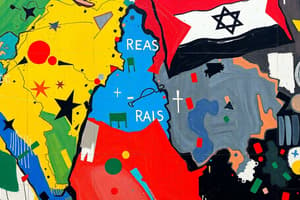Podcast
Questions and Answers
Quel est le principal facteur qui a conduit à l'émergence des États fragiles comme nouveaux champs de bataille pour la compétition géopolitique ?
Quel est le principal facteur qui a conduit à l'émergence des États fragiles comme nouveaux champs de bataille pour la compétition géopolitique ?
- L'intervention militaire des puissances occidentales
- La course aux ressources naturelles
- La susceptibilité à l'ingérence des puissances concurrentes (correct)
- Les efforts de consolidation de la paix menés par l'Ouest
Quel est le facteur le plus important qui a contribué à l'évolution du paysage géopolitique au Moyen-Orient ?
Quel est le facteur le plus important qui a contribué à l'évolution du paysage géopolitique au Moyen-Orient ?
- L'intervention militaire américaine
- L'émergence de nouvelles puissances régionales
- L'effondrement de l'Union soviétique
- Les révolutions et les guerres civiles intérieures (correct)
Quels sont les principaux acteurs impliqués dans les conflits géopolitiques au Moyen-Orient ?
Quels sont les principaux acteurs impliqués dans les conflits géopolitiques au Moyen-Orient ?
- Le Conseil de coopération du Golfe, la Ligue arabe et l'Organisation des pays exportateurs de pétrole
- L'Arabie saoudite, l'Iran, la Turquie, Israël, les États-Unis et la Russie (correct)
- L'Union européenne, la Chine, le Japon et l'Inde
- L'OTAN, l'ONU et l'Organisation de la coopération islamique
Quel est le principal facteur qui rend la région arctique de plus en plus importante sur le plan géopolitique ?
Quel est le principal facteur qui rend la région arctique de plus en plus importante sur le plan géopolitique ?
Quelle est la principale caractéristique de la compétition géopolitique dans les États fragiles ?
Quelle est la principale caractéristique de la compétition géopolitique dans les États fragiles ?
Quel est le principal défi géopolitique lié à la région arctique ?
Quel est le principal défi géopolitique lié à la région arctique ?
Quels pays revendiquent des parties de l'Arctique comme leur territoire ?
Quels pays revendiquent des parties de l'Arctique comme leur territoire ?
Quels pays sont impliqués dans des guerres par procuration dans différentes régions ?
Quels pays sont impliqués dans des guerres par procuration dans différentes régions ?
Que signifie le terme 'guerres par procuration' dans le contexte des conflits géopolitiques ?
Que signifie le terme 'guerres par procuration' dans le contexte des conflits géopolitiques ?
Quel est l'impact potentiel de l'implication accrue des pays dans les conflits régionaux ?
Quel est l'impact potentiel de l'implication accrue des pays dans les conflits régionaux ?
Que faut-il reconnaître pour comprendre les complexités des conflits géopolitiques ?
Que faut-il reconnaître pour comprendre les complexités des conflits géopolitiques ?
Flashcards are hidden until you start studying
Study Notes
Geopolitical Conflicts: Shifting Dynamics and Players
In recent times, the geopolitical landscape has undergone significant shifts, with a resurgence of great power rivalry and the emergence of new players challenging traditional power structures. This evolution has resulted in numerous conflicts that continue to affect international relations and stability.
The Middle East: A Region in Transition
Once characterized by relative stability following the end of the Cold War, the Middle East has experienced dramatic transformations. Domestic instabilities, such as revolutions and civil wars, combined with factors like U.S. war fatigue and the shale energy revolution, have altered the geopolitical landscape. The region now hosts key players, including Saudi Arabia, Iran, Turkey, Israel, the United States, and Russia.
Fragile States: New Battlegrounds for Great Powers
Fragile states have emerged as new arenas for geopolitical competition. Once seen as areas for peacebuilding efforts led by the West, these regions are now more susceptible to interference from competing powers. Competition for influence extends beyond diplomatic efforts, encompassing economic investments and security support arrangements, which can exacerbate existing fragilities.
The Arctic: A Contested Region
As climate change alters the polar ice caps, the Arctic region becomes increasingly valuable for its potential resource riches and strategic importance for international trade. Several nations, including the United States, Canada, Denmark, Norway, and Russia, claim parts of the region as their territory, leading to tensions and possible conflicts.
Proxy Wars: Revival of a Past Strategy
Proxy wars, once a hallmark of Cold War politics, have resurfaced in various forms. Countries like Turkey, Iran, Saudi Arabia, and the United Arab Emirates have increased their involvement in regional conflicts, sometimes on opposing sides. This dynamic intensifies the risk of escalating conflicts and prolonging hostilities.
Conclusion
Understanding the complexities of geopolitical conflicts requires recognizing the unique aspects of each region and the motivations driving the actions of various players. As geopolitics continues to evolve, addressing these conflicts will be crucial in maintaining stability and promoting peaceful coexistence among nations.
Studying That Suits You
Use AI to generate personalized quizzes and flashcards to suit your learning preferences.




